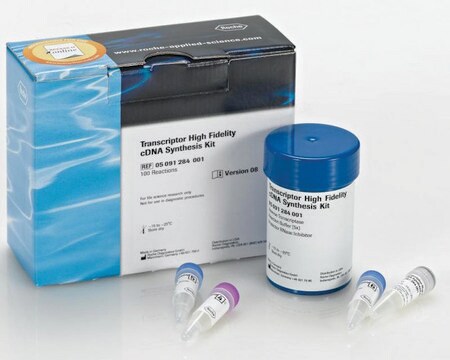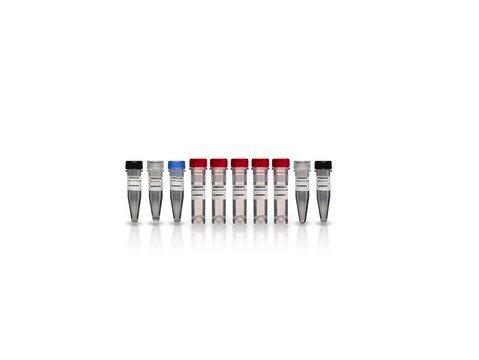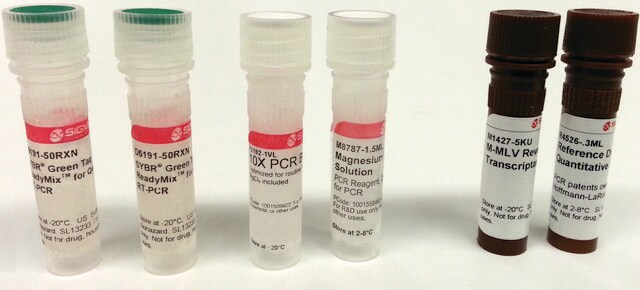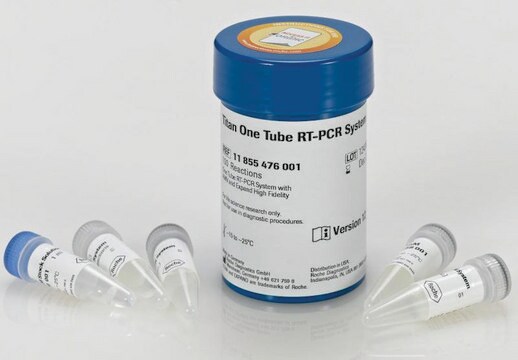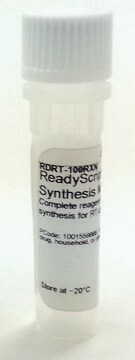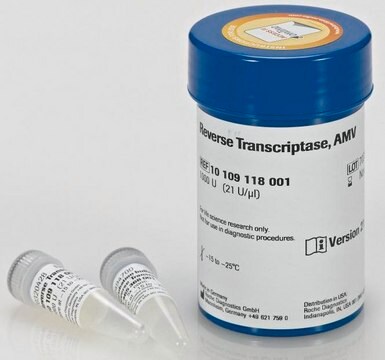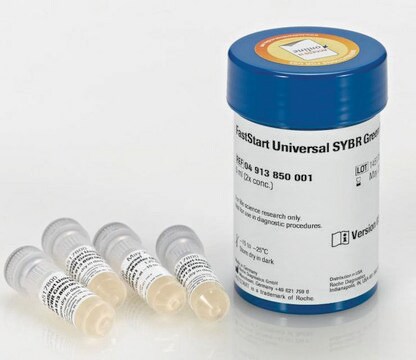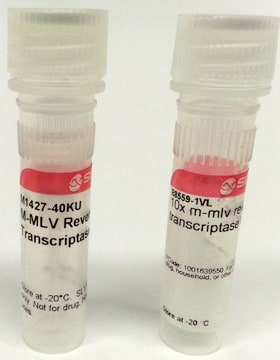Kluczowe dokumenty
11483188001
Roche
Zestaw do syntezy pierwszej nici cDNA do RT-PCR (AMV)
sufficient for 30 reactions (including 5 control reactions), kit of 1 (10 components), suitable for RT-PCR, hotstart: no, dNTPs included
Synonim(y):
RT-PCR, Synteza cDNA
About This Item
Polecane produkty
zastosowanie
sufficient for 30 reactions (including 5 control reactions)
Poziom jakości
aktywność właściwa
>50 units/μg protein
Właściwości
dNTPs included
hotstart: no
opakowanie
kit of 1 (10 components)
producent / nazwa handlowa
Roche
Parametry
42 °C optimum reaction temp.
metody
RT-PCR: suitable
moc wejściowa
purified RNA
temp. przechowywania
−20°C
Powiązane kategorie
Opis ogólny
AMV RT synthesizes the new cDNA strand at site(s) determined by the type of the primer used:
- at the 3′-end of the poly(A) mRNA when Oligo-p(dT)15is used as a primer,
- at nonspecific points along the mRNA template when using the random primer p(dN)6, or
- at a site determined by a sequence-specific primer.
Specyficzność
Reverse Transcriptase AMV
Zastosowanie
- Detection of the presence or absence of RNA viruses or other RNA-containing microorganisms (in combination with PCR)
- Quantification of mRNA for monitoring differential expression of a specific mRNA
- First step in the "differential display of mRNA"
- Generation of cDNA libraries with large and full-length inserts
- Reverse transcription-quantitative polymerase chain reaction (RT-qPCR) for reverse transcription of RNA into complementary DNA.
Cechy i korzyści
- Transcribes total RNA, mRNA and viral RNA along with difficult-to-transcribe secondary RNA structures
- Obtain cDNA transcripts up to 12 kb
- Higher thermostability (up to 50°C) and specificity than M-MuLV Reverse Transcriptase
- Purification of the resulting cDNA before PCR reaction is not necessary
It can be used with either sequence-specific primers, poly(dT)15 primers, or random primers, p(dN)6
Opakowanie
Jakość
Definicja jednostki
Inne uwagi
Tylko elementy zestawu
- Reverse Transcriptase AMV
- PCR Nucleotide Mix, pH 8.5 10 mM each
- Reaction Buffer
- MgCl2 Stock Solution 25 mM
- Gelatin 0.05% (w/v)
- Oligo-p(dT)15 , 0.02 A260 units/μl 0.8 μg/μl
- Random Primer p(dN)6 , 0.04 A260 units/μl 1.6 μg/μl
- RNase Inhibitor 50 U/μl
- Control Neo pa RNA (1.0 kb in length with additional 19-base 3′-poly(A) tail) 0.2 μg/μl
- Water, PCR Grade
Kod klasy składowania
12 - Non Combustible Liquids
Klasa zagrożenia wodnego (WGK)
WGK 1
Temperatura zapłonu (°F)
does not flash
Temperatura zapłonu (°C)
does not flash
Wybierz jedną z najnowszych wersji:
Masz już ten produkt?
Dokumenty związane z niedawno zakupionymi produktami zostały zamieszczone w Bibliotece dokumentów.
Klienci oglądali również te produkty
Biosynthetic Genes lovE and lovF
Produkty
Identyfikacja przyczyn i środków zaradczych dla wyzwań związanych z przygotowaniem próbki SDS-PAGE i optymalizacja warunków elektroforezy.
Protokoły
First Strand cDNA Synthesis Kit for RT-PCR (AMV) Protocol
Powiązane treści
RT-qPCR wykrywa określone cele z zastosowaniami w ekspresji genów i wykrywaniu patogenów.
Nasz zespół naukowców ma doświadczenie we wszystkich obszarach badań, w tym w naukach przyrodniczych, materiałoznawstwie, syntezie chemicznej, chromatografii, analityce i wielu innych dziedzinach.
Skontaktuj się z zespołem ds. pomocy technicznej
